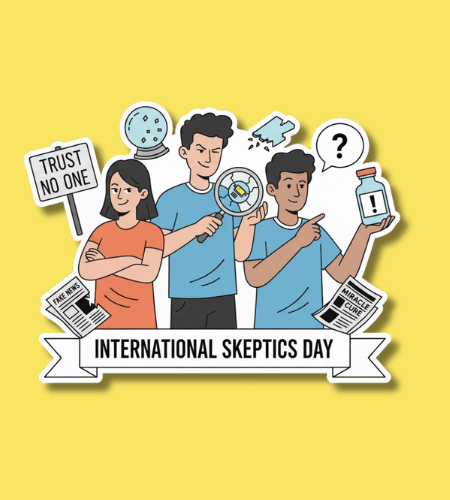International Skeptics Day is observed on October 13 each year, and the day is dedicated to celebrating critical thinking, questioning assumptions, and encouraging a healthy spirit of inquiry.
Table of Contents
History of International Skeptics Day
There is no clearly documented founding moment for International Skeptics Day. Some sources treat it as a grassroots observance that gradually gained recognition as a “fun holiday” for those who value skepticism and reason. Skeptical traditions go back millennia, with philosophers like Pyrrho of Elis, Socrates, and later skeptics contributing to our ideas of doubt, question, and inquiry. Over time, communities interested in science, rationalism, and secular inquiry have embraced this day as a time to reflect, challenge assumptions, and promote evidence‑based thinking.
Why is International Skeptics Day important?
In an era when misinformation, conspiracy theories, and polarized opinions abound, a day dedicated to skepticism reminds us that healthy doubt is not negative—it’s essential. It encourages people to pause before accepting claims, to ask “why?”, to look for evidence, and to guard against confirmation bias or blind acceptance. This kind of reflective stance helps strengthen public discourse, science literacy, and rational decision‑making.
Furthermore, International Skeptics Day helps build community among thinkers, educators, scientists, and curious individuals. It offers a moment to celebrate intellectual humility—the recognition that our beliefs might be mistaken—and to open conversations across belief systems. By doing so, it can reduce stigma around questioning and promote the view that doubt and inquiry are not obstacles to knowledge, but pathways to it.
Some of the values this day highlights include:
- Valuing evidence and reason over assertion
- Challenging assumptions and common beliefs
- Encouraging intellectual humility and openness
- Strengthening public understanding of science and critical thinking
- Fostering respectful discourse and curiosity
How to Observe International Skeptics Day
You don’t need a grand event to mark this day—simple shifts in mindset and action can make it meaningful. Start by picking one belief or “fact” you often assume and dig a bit: check sources, question its basis, and see what evidence supports or contradicts it. Share the journey of that inquiry with others—what surprised you, what questions remain.
You may also host or participate in a small “skeptic session”—a friendly discussion group where participants bring claims or ideas and the group examines them together, asking for evidence, pointing out logical gaps, or suggesting alternative explanations. Reading skeptical literature or listening to podcasts or lectures on science, philosophy, or critical thinking is another good way to engage. On social media, share quotes, insights, or challenges that invite your friends to question and think critically.
Here are a few simple ideas you can try:
- Pick a commonly accepted claim and research whether it holds up
- Host a “question everything” discussion with friends
- Read a skeptical or philosophy book or article
- Share a post that challenges assumptions in your circle
- Listen to a podcast or watch a documentary that critically examines a belief
International Skeptics Day Dates Table
| Year | Date | Day |
|---|---|---|
| 2026 | October 13 | Tuesday |
| 2027 | October 13 | Wednesday |
| 2028 | October 13 | Friday |
| 2029 | October 13 | Saturday |
| 2030 | October 13 | Sunday |
Subscribe to our newsletter and never miss a holiday again!

